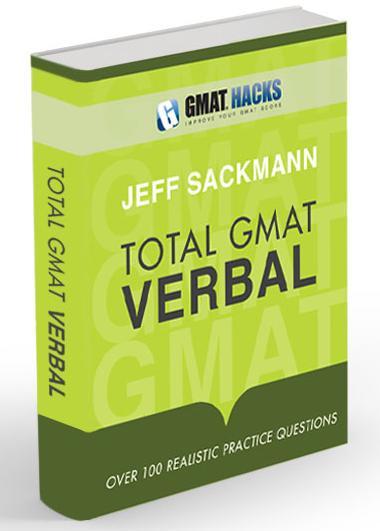
Bookshelf
|
|
Total GMAT Math Jeff's complete Quant guide, on sale now! |
|
|
Total GMAT Verbal Everything you need to ace GMAT Verbal! |
1,800 Practice Math Questions
Buy Jeff's books at Amazon.com

GMAT Official Guide, with IR
OG Math | OG Verbal
OG12 & Quant Rev solutions!
GMAT Question of the Day
Beginner's Guide to the GMAT
GMAT Hacks Affiliate Program

Recent Hacks

Categories
- General Study Tips
- Goals and Planning
- CAT Strategy
- The Mental Game
- GMAT Math Strategy
- GMAT Math Topics
- Mental Math
- Data Sufficiency
- Critical Reasoning
- Reading Comprehension
- Sentence Correction
- Analytical Writing Assessment
- Integrated Reasoning
- IR Explained
- Business School Admissions
- GMAT Prep Resources
- Practice Questions
- Total GMAT Math
- Total GMAT Verbal
- GMAT 111

Learning and Forgetting GMAT Content
| You should follow me on Twitter. While you're at it, take a moment to subscribe to GMAT Hacks via RSS or Email. |
Much of the GMAT is strategy and time management, but there is a substantial foundation of facts and formulas that you must know. There are a lot of ways to accomplish all of the necessary memorization, but there's no way around it.
I was prompted to this topic today by a recent article in Wired. It covers a man who has devoted his life to optimizing his study time, carefully tracking when he was exposed to certain facts and how well he remembered them. I don't think the article will do your GMAT score much good, but it is a fascinating read.
Repetition and Spacing
Learning (or perhaps more accurately, non-learning) follows a predictable pattern, the article explains:
[There] is an ideal moment to practice what you've learned. Practice too soon and you waste your time. Practice too late and you've forgotten the material and have to relearn it. The right time to practice is just at the moment you're about to forget. Unfortunately, this moment is different for every person and each bit of information. Imagine a pile of thousands of flash cards. Somewhere in this pile are the ones you should be practicing right now. Which are they?Fortunately, human forgetting follows a pattern. We forget exponentially. A graph of our likelihood of getting the correct answer on a quiz sweeps quickly downward over time and then levels off. This pattern has long been known to cognitive psychology, but it has been difficult to put to practical use. It's too complex for us to employ with our naked brains.
I'm not suggesting you follow Piotr Wozniak's lead and track every bit of information that goes into your brain, but there are some lessons to be learned from the general principle.
When you are exposed to something for the first time (or you learn something that you knew when you were a kid, but have long since forgotten), you need repetition. Simply reading the 45:45:90 triangle ratio in a book is probably not enough to ensure that you'll have it in your arsenal on test day.
How To Implement It
I generally advocate learning concepts by doing practice problems. Along with that, I emphasize the importance of quality over quantity--within a few days of seeing a question for the first time, review it, redo it, and master it. Doing GMAT questions is the best way to discover what concepts you need to know to do GMAT questions.
The reviewing and redoing is key. Most people do a question, maybe look over the explanation, and move on. Unless you stumble on a sequence of questions that touches on the same concept over and over again, you won't learn that way. You don't get that early repetition that is so important.
Working with sample questions, you need to provide the repetition. One way to do that is to simply redo the question multiple times in the space of a few days. Another way is to turn to my Total GMAT Math, which provides drills on just about every GMAT math topic. Still another is to tweak a problem to create your own, new question, one that might test the same concept but with new numbers.
In the longer term, consistent practice comes into play. You don't need to drill the new concept for long, but you do need to see it. The Official Guide is great in that regard--by mixing up questions and topics, you'll get that spaced-out repetition that you need.
The plan is simple: When you first see a concept, do everything you can to master it. Over time, make sure it will come up occasionally until you have to apply it on test day. As Piotr Wozniak shows, it can be rocket science, but it doesn't have to be.
About the author: Jeff Sackmann has written many GMAT preparation books, including the popular Total GMAT Math, Total GMAT Verbal, and GMAT 111. He has also created explanations for problems in The Official Guide, as well as 1,800 practice GMAT math questions.
 |
Total GMAT Verbal
The comprehensive guide to the GMAT Verbal section. Recognize, dissect, and master every question type
you'll face on the test. Everything you need, all in one place, including 100+ realistic practice questions. |